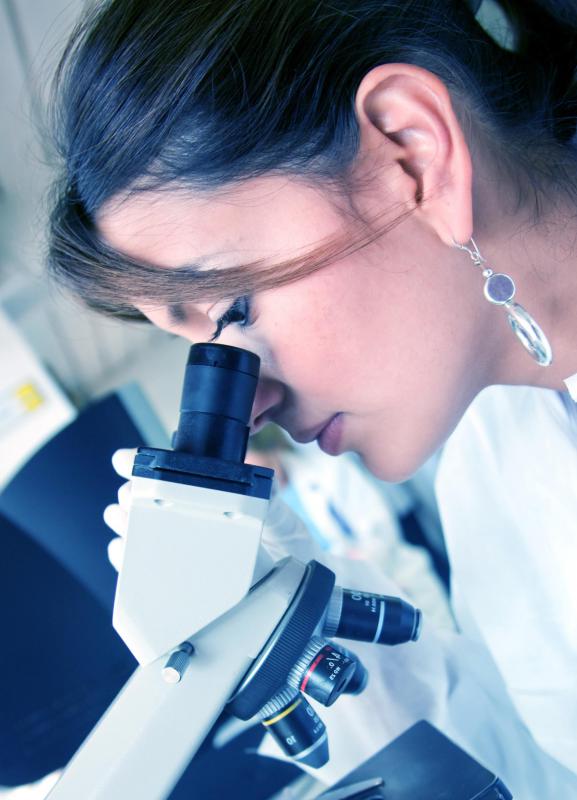At InfoBloom, we're committed to delivering accurate, trustworthy information. Our expert-authored content is rigorously fact-checked and sourced from credible authorities. Discover how we uphold the highest standards in providing you with reliable knowledge.
What is Molecular Genetics?
Molecular genetics is a sub-discipline of genetics, a field within the biological sciences. Genes are units of heredity, instructions for inherited traits such as hair color, blood type, and predisposition to some diseases. Molecular genetics is concerned with the physical and chemical properties of these genes.
Organisms depend on cells to grow and function. Each cell is essentially like a machine, following the instructions of its genes in order to run efficiently. The molecule that makes up genes is called deoxyribonucleic acid (DNA), which is stored inside the cells of organisms.

DNA is a long molecule, coiled tightly into structures called chromosomes. These chromosomes require strong magnification in order to be viewed. When viewed uncoiled, the DNA molecule resembles a twisted ladder, with two interwoven strands called a double helix. DNA’s double helix structure is a huge part of molecular genetics.
The field is also concerned with the structure and function of ribonucleic acid (RNA), a molecule essential to the running of cells. Structurally, RNA is quite similar to DNA, but they have different functions. The information in the cell’s DNA is copied to an RNA molecule, following which a protein designed for a specific task is assembled. In the human body, for example, a protein called hemoglobin allows red blood cells to carry oxygen to the body’s systems. The action of a gene producing a protein is called gene expression.

Gene mutations are changes in DNA that happen at a chemical level, and are also of interest in the field of molecular genetics. The genetics of cancer, in particular, is an area that is studied by molecular geneticists, who undertake research to better understand - and perhaps even prevent or cure - the disease. Gene therapy also calls for molecular geneticists. This type of therapy involves giving people new genes, and is an area being researched for the treatment of some diseases. Genetic engineering and cloning also come under the heading of molecular genetics.

Molecular geneticists often work in a laboratory environment, though they may also undertake roles that are research or teaching-based. Depending on the country in which they complete their education, molecular geneticists usually hold a bachelor’s degree in genetics and often an advanced degree, such as a PhD, as well. Some are also medical doctors who go on to specialize in genetics. In addition to specialists, a wide range of professionals in science, health, and education may come across this field of genetics in their working lives.
AS FEATURED ON:
AS FEATURED ON:














Discussion Comments
@NathanG - I don’t think that the scenario you’ve described stirs any controversy. It’s run of the mill, clinical molecular genetics and I believe that everyone is on board with that.
What stirs controversy is cloning, and in that regard, the passions run very high on either side. Do we have the right to create human clones? If we go down this path, will it lead down a slippery slope where we are attempting to create perfect humans and eradicate people with “imperfections,” as the Nazis did?
I am not saying that I subscribe to these beliefs; I am just saying that this is what’s being said. I do believe we need to have ethical discussions about these issues, although personally I am in favor of all forms of genetic engineering so long as it advances science.
I think the field of molecular human genetics is one that holds great promise for scientific discoveries in the health field. I am especially intrigued by the possibility for finding a cure for cancer.
What if scientists could figure out how the cancer gene worked, and then rewired it somehow so that the cancer ended up destroying itself? That would be as close as we might come to an actual cure. Or if it didn’t destroy itself, maybe at least it could be rendered benign.
Either way, molecular gene therapy would make this possible. I think we have to overcome the resistance of those who are always posing ethical concerns about genetic engineering, as if the whole intent of the scientific community was to create the next Frankenstein or something like that.
Post your comments